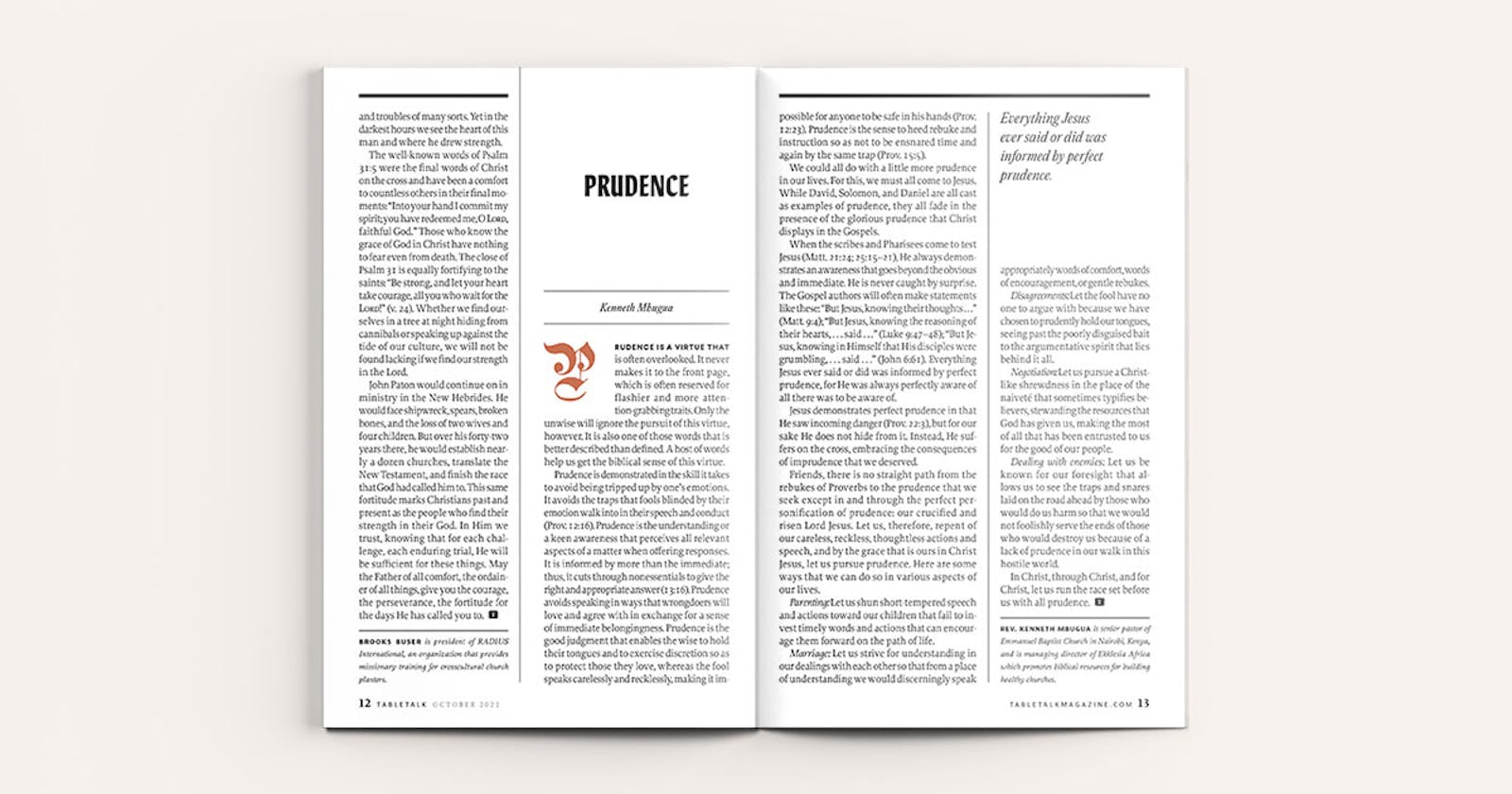
Request your free, three-month trial to Tabletalk magazine. You’ll receive the print issue monthly and gain immediate digital access to decades of archives. This trial is risk-free. No credit card required.
Try Tabletalk NowAlready receive Tabletalk magazine every month?
Verify your email address to gain unlimited access.
Prudence is a virtue that is often overlooked. It never makes it to the front page, which is often reserved for flashier and more attention-grabbing traits. Only the unwise will ignore the pursuit of this virtue, however. It is also one of those words that is better described than defined. A host of words help us get the biblical sense of this virtue.
Prudence is demonstrated in the skill it takes to avoid being tripped up by one’s emotions. It avoids the traps that fools blinded by their emotion walk into in their speech and conduct (Prov. 12:16). Prudence is the understanding or a keen awareness that perceives all relevant aspects of a matter when offering responses. It is informed by more than the immediate; thus, it cuts through nonessentials to give the right and appropriate answer (Prov. 13:16). Prudence avoids speaking in ways that wrongdoers will love and agree with in exchange for a sense of immediate belongingness. Prudence is the good judgment that enables the wise to hold their tongues and to exercise discretion so as to protect those they love, whereas the fool speaks carelessly and recklessly, making it impossible for anyone to be safe in his hands (Prov. 12:23). Prudence is the sense to heed rebuke and instruction so as not to be ensnared time and again by the same trap (Prov. 15:5).
We could all do with a little more prudence in our lives. For this, we must all come to Jesus. While David, Solomon, and Daniel are all cast as examples of prudence, they all fade in the presence of the glorious prudence that Christ displays in the Gospels.
When the scribes and Pharisees come to test Jesus (Matt. 21:24; 25:15–21), He always demonstrates an awareness that goes beyond the obvious and immediate. He is never caught by surprise. The Gospel authors will often make statements like these: “But Jesus, knowing their thoughts . . .” (Matt. 9:4); “But Jesus, knowing the reasoning of their hearts, . . . said . . .” (Luke 9:47–48); “But Jesus, knowing in Himself that His disciples were grumbling, . . . said . . .” (John 6:61). Everything Jesus ever said or did was informed by perfect prudence, for He was always perfectly aware of all there was to be aware of.
Jesus demonstrates perfect prudence in that He saw incoming danger (Prov. 22:3), but for our sake He does not hide from it. Instead, He suffers on the cross, embracing the consequences of imprudence that we deserved.

Friends, there is no straight path from the rebukes of Proverbs to the prudence that we seek except in and through the perfect personification of prudence: our crucified and risen Lord Jesus. Let us, therefore, repent of our careless, reckless, thoughtless actions and speech, and by the grace that is ours in Christ Jesus, let us pursue prudence. Here are some ways that we can do so in various aspects of our lives.
Parenting: Let us shun short-tempered speech and actions toward our children that fail to invest timely words and actions that can encourage them forward on the path of life.
Marriage: Let us strive for understanding in our dealings with each other so that from a place of understanding we would discerningly speak appropriately words of comfort, words of encouragement, or gentle rebukes.
Disagreements: Let the fool have no one to argue with because we have chosen to prudently hold our tongues, seeing past the poorly disguised bait to the argumentative spirit that lies behind it all.
Negotiation: Let us pursue a Christlike shrewdness in the place of the naiveté that sometimes typifies believers, stewarding the resources that God has given us, making the most of all that has been entrusted to us for the good of our people.
Dealing with enemies: Let us be known for our foresight that allows us to see the traps and snares laid on the road ahead by those who would do us harm so that we would not foolishly serve the ends of those who would destroy us because of a lack of prudence in our walk in this hostile world.
In Christ, through Christ, and for Christ, let us run the race set before us with all prudence.
